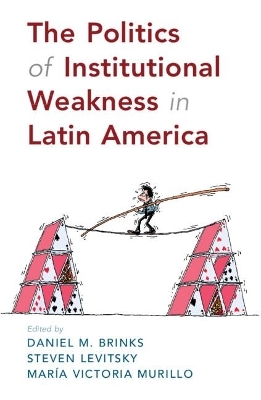
The Politics of Institutional Weakness in Latin America
Cambridge University Press (Verlag)
978-1-108-70233-1 (ISBN)
Analysts and policymakers often decry the failure of institutions to accomplish their stated purpose. Bringing together leading scholars of Latin American politics, this volume helps us understand why. The volume offers a conceptual and theoretical framework for studying weak institutions. It introduces different dimensions of institutional weakness and explores the origins and consequences of that weakness. Drawing on recent research on constitutional and electoral reform, executive-legislative relations, property rights, environmental and labor regulation, indigenous rights, squatters and street vendors, and anti-domestic violence laws in Latin America, the volume's chapters show us that politicians often design institutions that they cannot or do not want to enforce or comply with. Challenging existing theories of institutional design, the volume helps us understand the logic that drives the creation of weak institutions, as well as the conditions under which they may be transformed into institutions that matter.
Daniel M. Brinks is Professor of Government and of Law and Chair of the Government Department at the University of Texas, Austin. Dan's research focuses on the role of the law and courts in supporting democracy and human rights. His most recent book (with Abby Blass) is The DNA of Constitutional Justice in Latin America (2018), winner of the Corwin Award for Best Book on Law and Courts awarded by the Law and Courts Section of the APSA. Steven Levitsky is David Rockefeller Professor of Latin American Studies at Harvard University, Massachusetts. He is co-author of How Democracies Die (2018), a New York Times Best-Seller published in 15 languages. His other books include Transforming Labor-Based Parties in Latin America (2003) and (with Lucan Way) Competitive Authoritarianism (2010). He is currently writing a book on the durability of revolutionary regimes. María Victoria Murillo is a Professor in the Department of Political Science and the School of International Affairs and the Director of the Institute for Latin American Studies at Columbia University, New York. She is the author of Labor Unions, Partisan Coalitions, and Market Reforms in Latin America (2001), Political Competition, Partisanship, and Policymaking in the Reform of Latin American Public Utilities (2009), and (with Ernesto Calvo) Non-Policy Politics (2019).
1. Theorizing weak institutions; 2. When (electoral) opportunity knocks: weak institutions, political shocks, and electoral reforms in Latin America; 3. The stickiness of 'bad' institutions: constitutional continuity and change under democracy; 4. Presidential crises in Latin America; 5. Coercion gaps; 6. Aspirational laws as weak institutions: legislation to combat violence against women in Mexico; 7. The social determinants of enforcement: integrating politics with limited state capacity; 8. A multilevel approach to enforcement: forest protection in the Argentine Chaco; 9. What/whose property rights? The selective enforcement of land rights under Mexican liberalism; 10. Imported institutions: boon or bane in the developing world? 11. Social origins of institutional strength: prior consultation over extraction of hydrocarbons in Bolivia; 12. Conclusion.
| Erscheinungsdatum | 12.06.2020 |
|---|---|
| Zusatzinfo | Worked examples or Exercises; 22 Tables, black and white; 2 Maps; 5 Line drawings, black and white |
| Verlagsort | Cambridge |
| Sprache | englisch |
| Maße | 152 x 227 mm |
| Gewicht | 520 g |
| Themenwelt | Sozialwissenschaften ► Ethnologie |
| Sozialwissenschaften ► Politik / Verwaltung ► Staat / Verwaltung | |
| Sozialwissenschaften ► Politik / Verwaltung ► Vergleichende Politikwissenschaften | |
| Sozialwissenschaften ► Soziologie | |
| ISBN-10 | 1-108-70233-3 / 1108702333 |
| ISBN-13 | 978-1-108-70233-1 / 9781108702331 |
| Zustand | Neuware |
| Haben Sie eine Frage zum Produkt? |
aus dem Bereich


